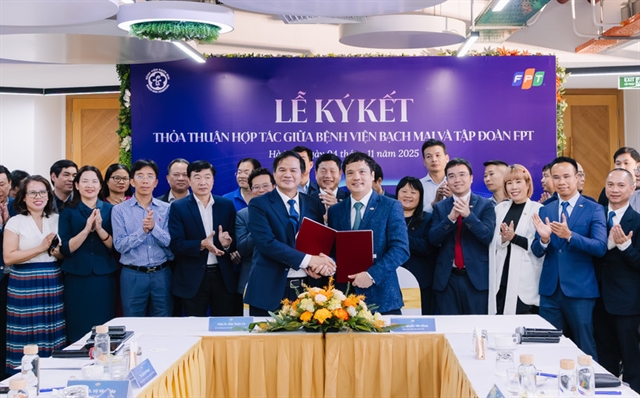Bach Mai Hospital and FPT Corporation announced a comprehensive strategic partnership to drive digital transformation and apply advanced technologies, especially artificial intelligence (AI), in medical diagnostics and treatment, hospital management, and healthcare workforce development

HÀ NỘI – Bach Mai Hospital and FPT Corporation announced on November 4 the signing of a comprehensive strategic cooperation agreement on digital transformation and the application of science and technology, particularly artificial intelligence (AI), in medical examination and treatment, hospital management and healthcare human resource development.
The event marks an important step in the roadmap to modernise Vietnam’s healthcare system, aiming to improve the quality of patient care, optimise hospital management and operations, and contribute to the implementation of Politburo Resolution 57-NQ/TW on breakthroughs in science and technology development, innovation and national digital transformation, as well as Resolution 72-NQ/TW on a number of breakthrough solutions to strengthen the protection, care and improvement of people’s health.
Associate Professor Đào Xuân Cơ, Director of Bach Mai Hospital, expressed the hospital’s ambition to become a smart hospital, where AI and digital technology will be applied not only in diagnosis, treatment and hospital management but also towards comprehensive automation. The hospital also aims to connect national health data, build digital health records for all citizens, lay the foundation for research and enhance healthcare quality.
Trương Gia Bình, Chairman of the Board of Directors of FPT Corporation, emphasised that the healthcare sector contains core elements for technology development. He said AI is advancing rapidly thanks to large language models (LLMs), built on the foundation of human language and knowledge. FPT wishes to accompany Bach Mai Hospital in mastering technology, building a smart hospital model and developing AI platforms to serve Vietnam’s healthcare sector.
Under the agreement, the two sides will cooperate comprehensively, focusing on four key areas: comprehensive digital transformation, the application of technology in medical care and treatment, healthcare provision and medical human resource development. – VNS





